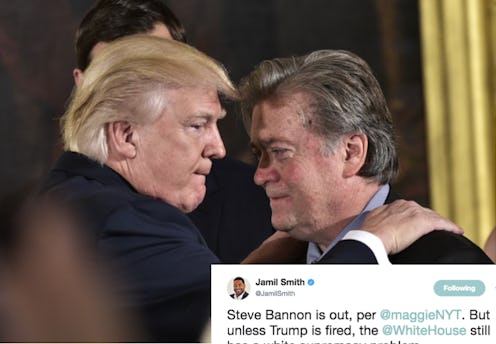News
This One Tweet About Steve Bannon's Departure Explains Why White Supremacy Still Lives In The White House

Following months of pressure from Democrats and moderate Republicans, the Trump administration announced on Friday that Steve Bannon would be leaving his position as White House chief strategist. It is still unclear, however, whether Bannon was fired or if he resigned. Bannon appealed to the right-wing nationalist base of Trump supporters who believe that the former Breitbart executive handed Trump the White House back in November. But as journalist Jamil Smith pointed out on Twitter, Bannon's departure doesn't mean white supremacy has left along with him.
Although Bannon recently referred to white supremacists as "a collection of clowns," he has previously described Breitbart News — where he used to be the executive chair — as "the platform for the alt-right." The Associated Press has limited its use of the phrase "alt-right," which can refer to a combination of white supremacists, white nationalists, populists, and neo-Nazis, but Bannon has generally embraced the term.
According to Mother Jones, Bannon has nonetheless denied that the so-called alt-right is actually racist or white nationalist. Even after acknowledging that homophobic, racist, and anti-Semitic people may be attracted to some of the principles espoused by this movement, Bannon was adamant that the self-described "alt-right" was not bigoted in these ways overall.
Bannon has been widely accused of being a white nationalist and white supremacist. He has promoted extremely Islamophobic policies, been accused of anti-Semitism by an ex-wife, and one of his favorite books is notably anti-immigrant. In fact, Bannon even went so far as to celebrate the violence carried out by white supremacists and neo-Nazis in Charlottesville, saying that the left's focus on racism would ultimately be a victory for Trump.
But as Smith made clear in his tweet, Bannon leaving the White House does not solve the problem of white supremacy. It likely was Bannon's influence that led Trump to pin the Charlottesville violence on the "alt-left" and "many sides," but Trump does not need any help to harness the tools of white supremacy.
Trump has consistently voiced support for racist figures — from Bannon to Milo Yiannopoulos — while also frequently making racist remarks himself. He has instituted travel bans that affect Muslim-majority countries, made racist comments about Mexicans, and most recently invoked an offensive legend with minimal historical evidence about General Pershing's actions against Muslim insurgents in the Philippines. He visibly failed to immediately denounce the actions of white supremacists in Charlottesville, and even after doing so, he walked back his comments.
Bannon may have helped Trump win by earning him the support of white supremacists, but it was Trump who accepted their support, Trump who emboldened them to hold rallies all over the country, and Trump who fails, time after time, to call out racist violence on American soil. Trump did not create white supremacy — the United States was founded on white supremacist ideals — and white supremacy will endure even after Trump is gone, but as long he continues to lend credibility to white supremacists, Bannon's departure will change almost nothing.